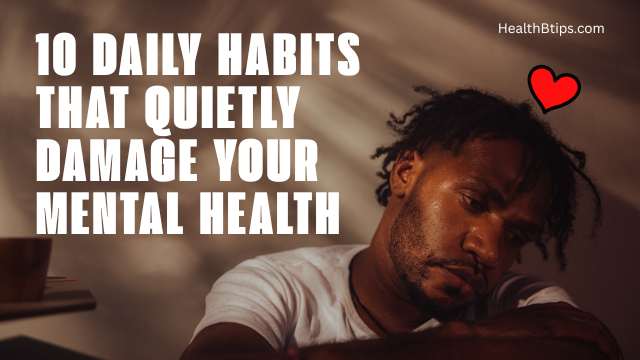In today’s fast-paced lifestyle, mental health often takes a backseat. We tend to focus on big stressors—work deadlines, financial problems, or relationship issues—while completely overlooking the small habits that chip away at our well-being every day.
The truth is, it’s not just the major life events that impact your mental state. Sometimes, it’s the little things you do daily—often without realizing—that silently hurt your mental health over time.
In this article, we’ll uncover 10 seemingly harmless daily habits that may be damaging your mental health, and how to break free from them to restore your inner balance.
1. Scrolling First Thing in the Morning
The habit of reaching for your phone immediately after waking up floods your brain with notifications, emails, and negativity from the news or social media. This creates instant stress before you even get out of bed.
Better alternative: Start your day with mindful breathing, stretching, or journaling instead of doom-scrolling.
2. Skipping Breakfast
A rushed morning without proper nutrition leads to blood sugar crashes, irritability, and poor concentration. Your brain needs fuel to function, and skipping meals can worsen anxiety and mood swings.
Try this: A balanced breakfast with protein, fiber, and healthy fats helps regulate emotions and energy throughout the day.
3. Bottling Up Your Emotions
Keeping your feelings to yourself may seem like a strength, but over time, emotional suppression builds internal pressure and can trigger anxiety, depression, or burnout.
Mental health tip: Practice emotional release—whether through talking to a friend, journaling, or seeking therapy.
4. Overconsumption of Caffeine
While one or two cups of coffee can boost alertness, excess caffeine can increase restlessness, anxiety, and interfere with your sleep cycle—ultimately harming your mental clarity.
Limit yourself to 2–3 cups max, and avoid caffeine in the late afternoon or evening.
5. Constant Multitaskin
Trying to juggle multiple tasks at once reduces focus and increases cognitive fatigue. Your brain works best with deep, single-task focus.
Pro tip: Use the Pomodoro technique (25 minutes of work, 5-minute breaks) to stay productive and mentally refreshed.
6. Neglecting Physical Movement
Sedentary routines—especially for remote workers—can worsen mood disorders and increase stress hormones like cortisol. Exercise releases endorphins, the “feel good” chemicals in your brain.
Easy fix: Aim for at least 30 minutes of light movement daily—walking, stretching, or yoga counts.
7. Comparing Yourself to Others Online
Platforms like Instagram or TikTok often showcase highlight reels—not reality. Constant comparison can lower self-esteem and fuel imposter syndrome.
Solution: Limit social media use and remind yourself: “Don’t compare your behind-the-scenes with someone else’s highlight reel.”
8. Not Getting Sunlight
Natural sunlight regulates your body’s circadian rhythm and supports serotonin production. Lack of exposure leads to low energy, mood dips, and even seasonal depression.
Tip: Get at least 15–30 minutes of sunlight every morning—ideally before 10 a.m.
9. Saying “Yes” to Everything
Always agreeing to things—even when you’re overwhelmed—leads to resentment, stress, and emotional exhaustion. This habit is especially common in people with low boundaries.
Learn to say no without guilt. Your time and energy are valuable.
10. Ignoring Your Sleep Hygiene
Sleep is the foundation of emotional regulation. Poor sleep habits (screen time before bed, irregular schedules, no wind-down routine) directly impact your mood, memory, and resilience.
Fix it:
- No screens 1 hour before bed
- Maintain a regular sleep schedule
- Keep your room cool, dark, and quiet
Final Thoughts
You don’t need to wait for a breakdown to start caring for your mental health. Small daily habits—if left unchecked—can silently sabotage your peace of mind.
The good news? Each of these habits can be reversed with conscious awareness and gentle effort. Mental wellness isn’t about perfection—it’s about progress.
Frequently Asked Questions (AEO Section)
Q: Can small daily habits really affect mental health?
Yes, even minor actions—like skipping meals or staying indoors all day—can accumulate and negatively impact mood, stress levels, and emotional stability.
Q: How can I build better habits for mental well-being?
Start by changing one habit at a time. Focus on sleep, hydration, and movement as your foundation. Use journaling or therapy to process emotions and reduce stress.
Q: Is it normal to feel anxious without any obvious reason?
Yes, often it’s the result of long-term exposure to low-level stress from unhealthy habits. Identifying and adjusting those triggers can improve emotional balance.
About the Author
Upulakshie Kodithuwakku is an SEO strategist and digital well-being advocate. With years of experience in content marketing and mental health storytelling, she helps individuals and brands create content that informs, heals, and ranks.





